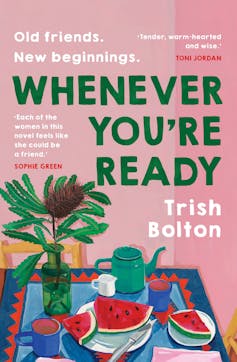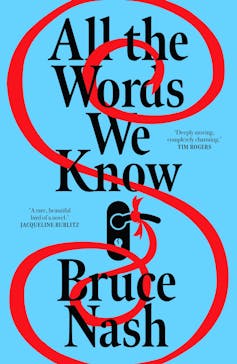‘i Hope Publishers Will Be Brave’: Older Women Are Often Erased In Fiction – But In 2 New Australian Novels They Take Centre Stage

If older women move through the world with a sense of being unseen, in the world of books, and especially in contemporary fiction, they have all but been erased. So pervasive is their absence, it is nearly possible to draw up a list of novels featuring older women as the main characters and plan to read them all.
Of those older women who do make it to the page, most will have been reduced to stereotypes: the demented, the eccentric, the quarrelsome, the devoted yet sidelined grandmother, the meddling mother-in-law, the faded beauty, the disappointed spinster.
Now at last, two novels by Australian authors feature older women as main characters.
Trish Bolton’s debut Whenever You’re Ready, offered up as a love letter to the lives of older women, is a novel with its heart in the right place. Bruce Nash’s All The Words We Know promises “wickedly funny” on its back cover, which – given its aged-care setting – is not impossible, but at first glance seems like a big ask.
Review: Whenever You’re Ready – Trish Bolton (Allen and Unwin), All The Words We Know – Bruce Nash (Allen and Unwin)
In her acknowledgements, Trish Bolton questions why so few books feature women in their 60s, 70s and beyond. If there is a single answer, it would seem to spring from a place of misogyny, combined with Western society’s deeply embedded ageism.
As far back as 1972, Susan Sontag identified the oppressive belief that men are enhanced by age, while women are progressively destroyed by it. “Competing for a job,” writes Sontag, “her chances often partly depend on being the ‘right age’, and if hers isn’t right, she will lie if she thinks she can get away with it.”
Novelist Trish Bolton questions why so few books feature women in their 60s, 70s and beyond. Sarah Walker/Allen & UnwinBolton’s character Alice Miller knows all about competing for jobs and lying about her age. As a 70-something ex-journalist, ex-model, ex-weather-girl on television, Alice, whose financial position is precarious, is living proof that the value placed on feminine beauty often crushes older women. Worse still, it can nudge them towards homelessness.
Alice is managing her downward slide with ingenuity and grace, when an unexpected death throws both her and her oldest friend Lizzie into a state of uncomprehending grief. In the aftermath of this loss, Lizzie, who has been nursing her own life-changing grief since the death of her young son Tom 30 years earlier, uncovers a decades-old secret that demolishes everything she believed she knew about her friendships, her family, and her marriage.
Read more: Friday essay: homesick for ourselves – the hidden grief of ageing
Lives of older women
Through the lives of the older women at the heart of this book, Bolton highlights the range of difficulties – social, financial, and political – that impact the lives of women as they age. Not the least of these is their own internalised ageism, as demonstrated by age-denying Alice.
Baby boomers, she thought with contempt They were so … well, old. Present company excepted. She was much more millennial in her outlook. And she could pass for a Gen Xer. Everyone said so.
A survivor of breast cancer, and of domestic violence, when Alice raises with her doctor the possibility of her breast implants causing cancer, he answers dismissively. “Given your age, there doesn’t seem much point in replacing them.”

Claire had been the friend who visited Alice almost every day following her double mastectomy. Perhaps a little unfairly, Alice remembers Lizzie had made an effort, but “she hadn’t long lost Tom, his death becoming a lifelong excuse for self-pity”.
With the death of her youngest child, a philandering husband, and her daughter Margot’s youthful addictions, Lizzie has not had the smoothest of lives. But at a boarding school her parents could never have afforded without her scholarship, she had been befriended by the “worldy and carefree” Claire, and they’d remained close, along with Alice, through the ups and downs of their lives. Now, their mutual trust and friendship is tested with the revelation of a long-held secret.
The grief in Whenever You’re Ready is all too believable – the loss of a child, the death of a friend, the end of a marriage, misunderstandings distancing a mother and daughter – yet at times it feels a little overwrought, as if characters can only express emotion through extravagant physical gestures:
Lizzie let Fred in, collapsing beside him on the rug. How long she lay there, she wasn’t sure.
By contrast, some of the most affecting scenes in the book are between Lizzie and her 95-year-old mother Joyce, who is in a nursing home following a stroke. Lizzie’s sadness at the conditions that prevail in the home is beautifully understated in quiet, sobering passages:
It always felt strange that life outside went on, thought Lizzie, after saying goodbye to her mother. There was so much sorrow within those four walls she wondered how it could possibly be contained, that it must surely seep out under doors, escape through an open window, any chink or gap, the sadness affecting passers-by, causing them to stop for a moment and think of those hidden from view.
Joyce’s roommate, Grace, has never had a visitor, Joyce tells Lizzie. “Not a one.” Like others before her, Grace will simply disappear in the night. “Here when I went to sleep, gone when I opened my eyes,” as Joyce says of Aggie, an earlier roommate.
When Joyce’s condition deteriorates, Lizzie insists on being the one to bathe her, to change her gown and see to her hair. “In her final hours, she wanted her mother to feel only the gentle touch of loving hands.”
Following on from writers like Liz Byrski, in The Woman Next Door (2016), and more recently Charlotte Wood, in The Weekend (2021), both of whom have risked casting older women in lead roles in their fiction, Trish Bolton has given older readers a rare opportunity to recognise aspects of their lived experience within the pages of a contemporary novel.
Whenever You’re Ready is a much-needed documenting of the very real difficulties experienced by older women. It never diminishes the characters by treating them as stereotypes, and not even 95-year-old Joyce is sacrificed to dementia.
Lizzie, Claire, and Alice are very much the women they have always been, only older. This novel makes them visible; it asserts their right, and the right of older women everywhere, to be respected, and to be seen as people still living lives that matter.
Read more: Friday essay: grey-haired and radiant – reimagining ageing for women
Plunged into dementia
Bruce Nash’s All The Words We Know plunges the reader headlong into the consciousness of dementia-affected Rose as she roams the corridors of an aged-care home with her walker.
The nursing home is a place where nothing is certain, and the lack of certainty generates a sense of threat. When Rose sees her friend lying on her back in the car park after having apparently fallen from a window to her death, she concludes the friend has been murdered, and that she herself is to be next.

The care home is peopled by The Angry Nurse, The Scare Manager, the nice boy who mops floors, the fellow who doesn’t live here. It is a world where even Rose herself is a woman “in her eighties”, rather than someone precisely placed in time.
The restrictive first-person narrative, and its relentless present tense, demands patience from the reader. It also cuts off almost all routes to other times and places in which we might have learned where and how Rose once lived.
Having been shown how life once was, we might have mourned its loss; as it is, there is a narrow pathway into the past through Rose’s flickering memory, but it is unreliable. Once again, it is peopled by indeterminate characters, such as “the older fellow”, and the man with no head, who we eventually learn was Rose’s first husband.
Writers like Fiona McFarlane (The Night Guest, 2013) and Thea Astley (Coda, 2012) have guided readers safely, even elegantly, through the challenging territory of dementia in fiction.
But they wisely chose the more fluid and forgiving third-person narrative viewpoint. In skilled hands, a close third-person viewpoint works like a first-person account: it’s a view that provides respite for the reader from the cyclical thought processes of the dementia-affected character and enables narrative shifts through time and space.
Read more: 'We are only passing through': stories about memory, mortality and the effort of being alive
Word play and empathy
Nash’s novel is reminiscent of Astley’s Coda in, among other things, the pleasure their main characters take in word play. Coincidentally, both novels are described on their back covers as “wickedly funny”. Neither Nash’s Rose, nor Astley’s Kathleen, are in situations that are even remotely funny, so the wicked humour occupies the space between assumptions about what the women know, or remember, and what they actually do know and remember.
Like Kathleen, Rose loves words. Sometimes she genuinely gets them wrong, and sometimes it’s on purpose. Unfortunately, she has a habit of interpreting her mistakes, a task that would have been much better left to the reader. For example:
“Are you happy here?” asks the Angry Nurse, as if she’s wondering whether I’m using my incongruence pads. Incontinence pads.
A small group is gathered around her. All in their unicorns. Uniforms.
My walker and I ride in the thing, the revelator. Elevator.
Veteran British writer Penelope Lively has written (in her 2013 memoir Ammonites and Leaping Fish) that “fiction is perhaps mainly responsible for the standard perception of the old”, and “memorable and effective writing about old age is rare”.
All The Words We Know strives to generate empathy towards those doing it tough with dementia, and to change our perception of their situation. It certainly succeeds in tapping into the horror of lives lived behind locked doors, lives stripped of agency.
Some of the book’s most memorable moments take place in the cracks between Rose’s repetitive thought processes and the unfolding of the plot. Here is Rose in the dark:
All through the dark night I lie in my bed, facing up to things.
And contemplating time:
Time, in this place, is most unusual. That’s not true. In this place there is so much time, there’s nothing unusual about it whatsoever. There is no shortage of time here at all. At night, in this place, you live forever. Well, the night goes on forever, and being, to the best of my knowledge, alive, I go on with it.
On the monotony of daily life:
Nothing happens, and it keeps not happening, then doesn’t happen some more. It continues, and I continue with it.
Rose’s son is lying to her; he’s stealing her money. Her daughter, apparently lost for anything meaningful to say, fills her visits by moving Rose’s pot plants into the bath to be watered, and moving them back again. As characters, both son and daughter lack nuance by virtue of being pinned in Rose’s first-person narrative beam. Both seem unhappy, but the main thing about her son is that he has “the Power of Eternal”.
There are small, devastating moments that stab at one’s heart, as when Rose is in the dining room with the “fellow who doesn’t live here”, even though he actually does:
“I’m just visiting,” he says.
“Of course you are,” I say, and wait.
He looks around at everyone in their places at the dining tables, at the walkers and wheelchairs lined up against the wall. At the smiling sharks.
“I have a beautiful home,” he says. “With a white fence and a double lock-up garage.”
Real-life dilemmas
Both Trish Bolton and Bruce Nash have opened up an important space for older people as main characters in contemporary Australian fiction. I hope publishers will be brave and other novels by other writers will soon follow.
Whenever You’re Ready brings the real-life dilemmas of older women to the page, and from there, one hopes, the situations and social issues thrown up will trickle out through our culture, into the places where meaningful policy-making takes place.
While All The Words We Know might not be read by those suffering dementia, it will certainly have many readers who’ve suffered through the decline of ageing parents.
Its subtext is any one of us could become Rose, could suffer her sense of loneliness and be forced to self-soothe by conjuring a life out of the view from a particular window, or by indulging in word games.
Most of all, it shows that the ways we look after our old people are not sufficient to their needs, and that this – as the 2018 Royal Commission into Aged Care Quality and Safety concluded – is a cause for national shame.
Carol Lefevre does not work for, consult, own shares in or receive funding from any company or organisation that would benefit from this article, and has disclosed no relevant affiliations beyond their academic appointment.


